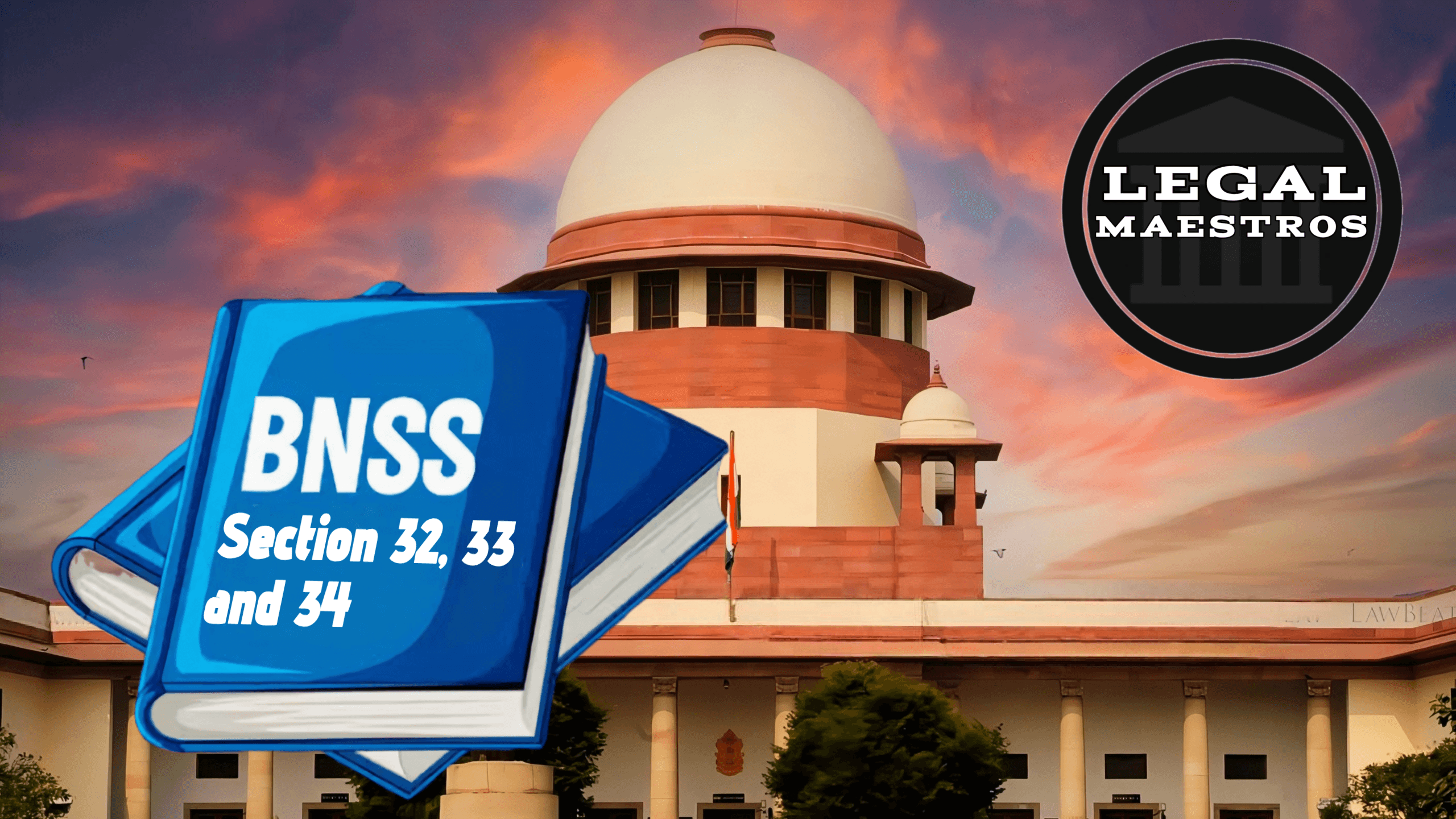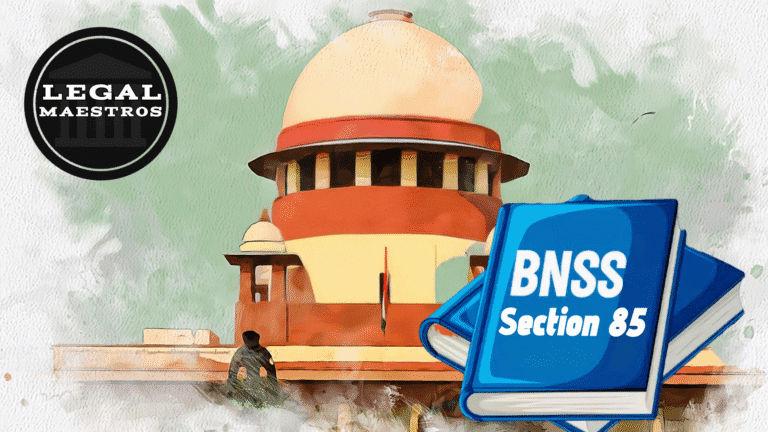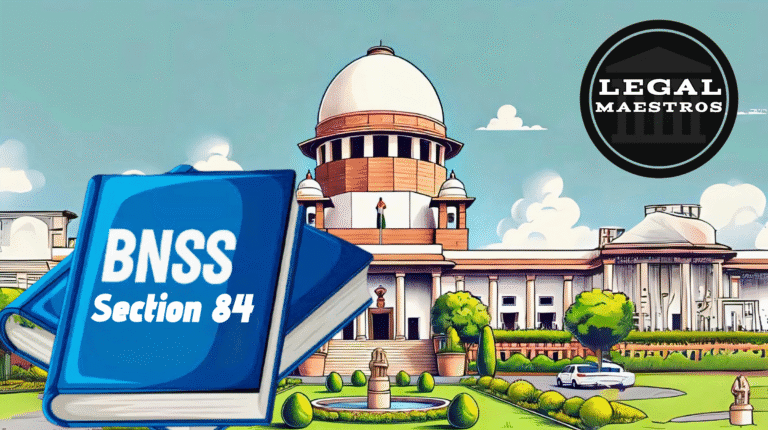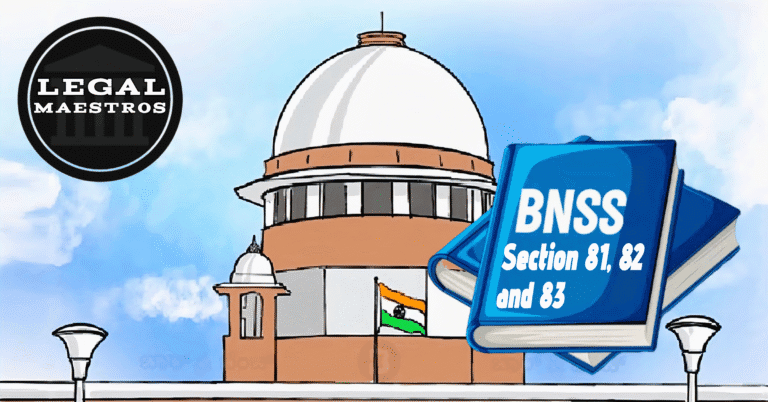
Section 32: Assistance in Executing a Warrant by a Non-Police Officer
The Bharatiya Nagarik Suraksha Sanhita, 2023, has provisions for cases in which a warrant is granted to a person other than a police official. These requirements are outlined in Section 32 of the law. During the execution of the warrant, this component guarantees that the individual in question is not acting alone. When certain conditions are met, it permits other individuals to help in the execution of the warrant; nevertheless, this is only the case.
One of the most important requirements is that the individual to whom the warrant is addressed must be physically present and actively involved in the process of carrying out the warrant. If this criteria is satisfied, then any other person is legally entitled to assist in the execution of that warrant, as stated in the section, which makes this point very obvious.
Take, for example, the scenario in which a revenue investigator is given a warrant to confiscate specific property in connection with a tax evasion investigation. When he arrives to the place with the warrant, he is met with opposition while he is carrying out the execution of the order. In the event that he is present and carrying out the warrant at that same moment, people in the immediate vicinity, such as members of the village or spectators, are able to legally assist him in the procedure. On the other hand, if he is not present or if he is not actively acting on the warrant, then other people are unable to interfere and act independently on his behalf.
For any queries or to publish an article or post or advertisement on our platform, do call at +91 6377460764 or email us at contact@legalmaestros.com.
A lawful execution is ensured by this feature, which also prevents misuse by those who have not been confirmed.
Section 33: Obligation of the Public to Report Certain Offences
According to Section 33, there is a significant obligation for every citizen to report certain offenses or intentions to commit them to the authorities if they ever become aware of such offenses or intentions. Due to the fact that this is a legal obligation, failure to complete it without a valid cause may result in legal repercussions.
Within the context of the Bharatiya Nyaya Sanhita, 2023, this provision provides a list of certain offenses for which this requirement is applicable. The nature of these offenses is deemed to be significant, and they have the potential to disrupt public order and safety. In accordance with this provision, the following passages of the Bharatiya Nyaya Sanhita are taken into consideration:
For any queries or to publish an article or post or advertisement on our platform, do call at +91 6377460764 or email us at contact@legalmaestros.com.
For More Updates & Regular Notes Join Our Whats App Group (https://chat.whatsapp.com/DkucckgAEJbCtXwXr2yIt0) and Telegram Group ( https://t.me/legalmaestroeducators )
The sections 145 to 152, as well as the section 156, which are concerned with riots and unauthorized assembly
Sections 187 and 189 (which are concerned with getting in the way of public servants)
For any queries or to publish an article or post or advertisement on our platform, do call at +91 6377460764 or email us at contact@legalmaestros.com.
In relation to the adulteration of food, drink, pharmaceuticals, and other substances, sections 272 to 278
section 101, section 102, and section 103 (which are concerned with actions that threaten the sovereignty or integrity of India)
Regarding offenses committed against women or children, Section 138 states that
For any queries or to publish an article or post or advertisement on our platform, do call at +91 6377460764 or email us at contact@legalmaestros.com.
An attempt to commit murder is covered by Section 305.
causing death by negligence, culpable homicide, and murder are the crimes covered by sections 307 to 311.
In relation to the act of producing a miscarriage without the permission of the lady, Section 314
For any queries or to publish an article or post or advertisement on our platform, do call at +91 6377460764 or email us at contact@legalmaestros.com.
The sections 322 to 326 (which are concerned with severe injuries)
Regarding the wrongful imprisonment of individuals, Section 330
Regarding the aiding and abetting of criminal acts, Section 329
For any queries or to publish an article or post or advertisement on our platform, do call at +91 6377460764 or email us at contact@legalmaestros.com.
These sections (relating to failing to report and providing misleading information) are numbered 176 to 180.
According to the law, everyone who is aware of these offenses or their intention to commit them is required to report them to the nearest Magistrate or police officer, unless they have a valid and acceptable excuse for their silence. Immediately, without any delay, the individual is obligated to disclose this information “forthwith,” which means immediately.
However, the individual who failed to report is the one who is responsible for establishing that there was a valid justification for not reporting the incident. Because of this, it is ensured that individuals do not neglect major offenses that they are aware of.
For any queries or to publish an article or post or advertisement on our platform, do call at +91 6377460764 or email us at contact@legalmaestros.com.
As an illustration, if someone gets aware that another person intends to commit murder or is aware of someone who has caused grievous hurt in accordance with Section 326, they are required to promptly alert the police or a Magistrate. Should they fail to do so and thereafter assert that they were ignorant or afraid, they will be required to demonstrate that the reason they did not report was a valid one.
Furthermore, the term “offence” in this context encompasses all actions carried out outside of India, provided that those actions would be regarded as offenses according to Indian law. This extends the culpability even in situations where the criminal act or the planning of the crime took place outside of Indian territory.
Section 34: Duty of Village Officers and Residents to Report Specific Matters
In accordance with Section 34, village officers and inhabitants are obligated to submit a number of different types of information that are essential for the upkeep of peace and order. The inclusion of this clause is absolutely necessary in order to guarantee that rural areas are not excluded from the national framework of legal accountability and surveillance of criminal activity.
For any queries or to publish an article or post or advertisement on our platform, do call at +91 6377460764 or email us at contact@legalmaestros.com.
The individuals who are accountable for the violations of this section include all officers who are involved in the administration of the village. These officers include members of the village panchayat, the headman, and any other authorized individuals. Furthermore, because of the law, each and every person who lives in the community is required to make a report.
The following are some of the occurrences that are required to be reported:
In the vicinity of the area, there are known criminals.
Any individual who is aware of the presence, whether it be permanent or temporary, of a person who is a well-known receiver or seller of stolen items inside or near the village is required to report this information.
For any queries or to publish an article or post or advertisement on our platform, do call at +91 6377460764 or email us at contact@legalmaestros.com.
Movement That Is Suspicious On the way to or within the Village
It is imperative that everyone who observes a person who is either going through the village or lives there and whom they know or suspect to be a thug, robber, escaped convict, or proclaimed offender is required to report their observations to the authorities.
Criminal Acts of a Serious Nature or the Intention to Commit Them
It is required that any offense that is not eligible for bail or an offense that falls under Sections 187 and 189 of the Bharatiya Nyaya Sanhita, 2023, that is committed or intended to be committed in or near the village be officially notified.
Suspicious or non-natural causes of death
It is imperative that any instances of unexpected, unnatural, or suspicious deaths, as well as the discovery of corpses or body parts in the vicinity, be immediately reported to the local Magistrate or police station where the incident occurred. Similarly, if a person vanishes under circumstances that indicate they have committed a crime for which they are not eligible for bail, this must also be reported.
For any queries or to publish an article or post or advertisement on our platform, do call at +91 6377460764 or email us at contact@legalmaestros.com.
Intentions to commit crimes or crimes committed outside of India but in close proximity to the village
Any conduct that is committed or planned outside of India but close to the village and that would be considered a penal offence under Sections 176 to 179, 101, 103, 305, 307 to 311, and 330 of the Bharatiya Nyaya Sanhita, 2023, is required to be notified. It is especially important to keep this in mind for border villages.
Issues That Have an Impact on Public Order
If the District Magistrate has issued a general or special order (with the consent of the State Government) requiring the reporting of such information, then any information that could potentially impact public safety, order, or the prevention of crime must be reported.
The local administration is given more power and accountability is increased among the citizens and bureaucrats at the village level thanks to this part. In order to combat and prevent criminal activity, it functions as a surveillance tool at the grassroots level.
For any queries or to publish an article or post or advertisement on our platform, do call at +91 6377460764 or email us at contact@legalmaestros.com.
Definitions from the 34th Section
The following crucial words are also clarified in this section:
The term “village” refers to not only the residential area but also the areas that are located in close proximity to the village.
For any queries or to publish an article or post or advertisement on our platform, do call at +91 6377460764 or email us at contact@legalmaestros.com.
Individuals who have been declared to be offenders by courts, even in regions where this law may not apply, but whose actions would be punishable under Indian law with imprisonment for ten years or more, life imprisonment, or death are included in the category of “proclaimed offenders.”
All individuals who are active in managing or assisting in the administration of the village, including the members of the panchayat and the headmen, are considered to be officers in connection with village affairs.
Consider the following scenario: a village headman discovers that a well-known thief is residing on the outside of the hamlet. He is obligated to immediately notify the authorities. In the event that he also learns that someone in the community is intending to commit a crime that cannot be released on bail, he is unable to maintain his silence. To add insult to injury, the law requires a villager to immediately report the discovery of a dead person in a suspicious circumstance to either the police or the Magistrate.
For any queries or to publish an article or post or advertisement on our platform, do call at +91 6377460764 or email us at contact@legalmaestros.com.





![JOB POST: Junior Associate at ASM Law Chambers, Jaipur [Freshers]](https://legalmaestros.com/wp-content/uploads/2025/11/Gemini_Generated_Image_8wrxer8wrxer8wrx-768x708.png)


1 thought on “Sections 32-34, Bharatiya Nagarik Suraksha Sanhita, 2023: Non-Police Assistance in Warrants and Public, Village Duty to Report Offences”